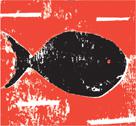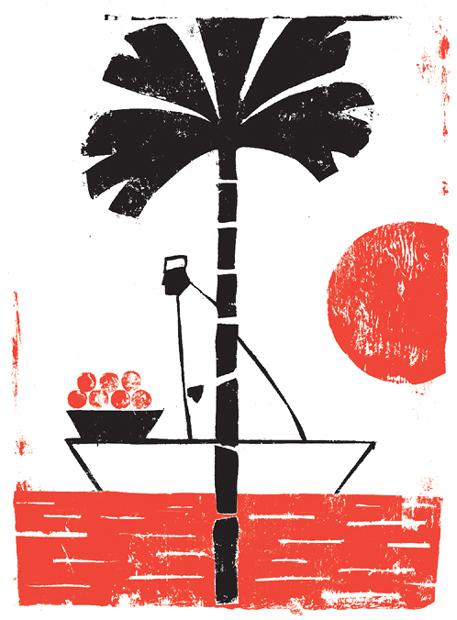So Chike led the way and the mechanic followed, riding slowly on one of his bicycles. Chike was afraid of taking the man to his uncle. So he decided to take him round and round the town. They went up one street, down the next, and up the third.
“Where do you say you live?” asked the mechanic.
“I don’t know the number,” said Chike. “But it is over there,” and he pointed in front of him.
After a long time they were back where they started. The mechanic was now furious and was threatening to beat hell out of Chike. Because he was so furious he did not look where he was going and ran into a woman returning from the market with her purchases. Her enormous basket fell down on the road and the contents were scattered. She immediately took off her headcloth and tied it firmly round her waist, ready for a fight. She held the mechanic by his shirt and was shouting abuses into his face.
“I had twenty pounds’ worth of goods in that basket. Give it to me now.”
Crowds were gathering. Some people were picking up the woman’s things and putting them back into the basket. There were tomatoes, some dried fish, and small yams. But her voice rose higher and higher. She said she was not going home to prepare a meal from things picked off the road. She wanted her twenty pounds.
In the confusion Chike melted away and ran home faster than he had ever done before.

12 The Miserly Trader
Chike did not entirely give up hopes of crossing the River Niger. But it now seemed more unlikely than ever that he would find the money. So he thought, what was the use of dreaming? As his mother used to say:
One day Chike saw Mr. Nwaba counting bundles and bundles of pound notes. He had not known that so much money existed in the world. If Mr. Nwaba had so much, Chike thought, why did he live so miserably? He lived in one room with his wife and five children. They ate hardly anything else but garri. If his wife put much fish in the soup he would rave and curse. Sometimes he even beat her. His children wore threadbare clothes to school and were always last to pay their school fees. He rode an old rickety bicycle for which he never bought a license. Whenever he heard that policemen were stopping cyclists to check their licenses, he put his old machine away for a week or two. His neighbors called him Money-Miss-Road behind his back.

Chike was so desperate for money that he began to hope that this miser might give it to him. So when Mr. Nwaba came home from his stalls in the evening of the next day Chike went out and said “Good evening, sir” to him and rolled in his bicycle.
Mr. Nwaba seemed very pleased. He returned Chike’s greeting with “Good evening, my son” and a broad smile. For about a week Chike did the same thing every evening. But Mr. Nwaba never seemed to think of giving him anything except once when he dipped his hand into the pocket of his khaki trousers. Chike’s heart beat with expectation. Mr. Nwaba brought out his hand again and gave Chike three groundnuts.
Mr. Nwaba was always thinking of profit and loss and doing sums in his mind. One day Chike greeted him with “Good morning, sir.” He replied, “Five pounds.”
His full name was Mr. Peter Nwaba. He was well known in the town and went to church regularly. Every Sunday morning he put on his gorgeous

Sometimes Mr. Nwaba left his room very late at night and would not come back till the following day. People said he belonged to a secret society which met only at night.
One night Chike had an upset stomach after eating unwashed mangoes. At about four o’clock in the morning he got up to go to the latrine. As he opened the door he heard footsteps outside. He held the door nearly closed and peeped out. It was Mr. Nwaba and another strange man returning from somewhere. They stood outside and talked for a while. Then the stranger went away and Mr. Nwaba retired to his room.
Chike did not give much thought to this incident at the time. But he was to remember it later.
13 Chike’s Dream Comes True
Chike’s chance came suddenly. It happened on a public holiday. His uncle had gone to Umuofia for the holiday and was not expected back until the next day. Chike ate his lunch quickly and went down to the riverside without saying a word to Michael. Since he had no money he did not think of crossing the river. All he wanted to do was to watch the boats.
When he got to the bank he found many cars and lorries waiting to be ferried. Then he saw three boys with buckets of water washing some of the cars. He saw also that when they had finished the owners gave them some money. Why did I not think of this before? he asked himself. He raced back home and took a bucket and a piece of rag and ran all the way back. To his utter disappointment the boat had gone and there were no more cars around, only lorries. But soon other cars began to arrive and Chike’s hopes revived. So far three had arrived. But they were all very small cars. Chike thought it would be better to go for a big one with a wealthy owner. Soon an enormously long car pulled up. Chike immediately approached it.
The owner looked like a very important person. Perhaps he was a minister. Then Chike lost his boldness. He stood by the car wondering what to say. But while he hesitated one of the other boys marched up to the man and said, “May I wash your car, sir?”
At first the man ignored him but he did not give up. He spoke again, “Oga, your car dorty plenty. I fit wash am fine.”
This time the man looked at him and nodded. The boy smiled and set to work. Chike bit his lips. He said to himself,
Then one small car arrived. Chike, no longer choosy, wasted no time at all. He went up to the owner and said in good English, “May I wash your car, sir? It is very dirty and you are going to Lagos.”
The man smiled and said, “Go ahead.”
Chike filled his bucket with water from a nearby tap and set to work.
When he had finished he told the owner. But the man was busy talking to his friend and paid little attention to Chike. He said “Thank you” without looking at Chike and continued talking. Chike stood there, shifting from one foot to the other. Eventually the man looked at him again and put his hand into his pocket. Chike’s heart beat faster. He brought out a handful of coins and gave one to Chike.
“Thank you, sir,” said Chike. Then he looked at the coin and saw that it was one shilling. In his joy he said again, “Thank you, sir.” The man did not reply; he was talking to his friend again, with a cigarette in his mouth.

14 Chike on the Boat
Chike’s dream had come true; at last he could go to Asaba. He jumped up and down several times and sang “One More River to Cross.” It was one of the songs he had learnt at the C.M.S. Central School, Umuofia.
He joined the queue of other passengers. When his turn came he gave the shilling to the cashier who gave him a ticket and sixpence change. His heart was aglow with happiness. After today he would be able to say to his friends, “I too have been to Asaba. There only remains Lagos.”
The next ferry was a long time coming. Chike became very impatient. He walked up and down, whistling:

